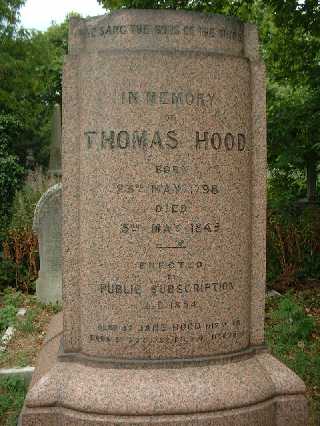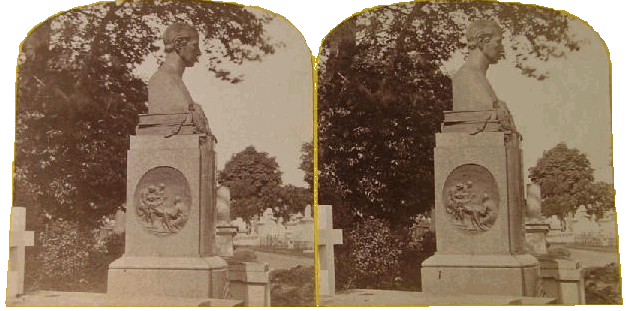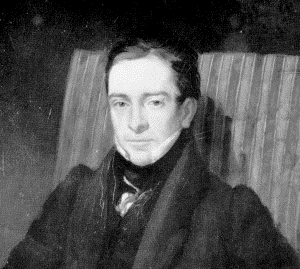|
In addition to the humorous work for which he is perhaps chiefly remembered (including 'Miss Kilmansegg', which appeared in the 'New Monthly Magazine'), Hood wrote a number of serious poems: the popular 'Song of the Shirt' (published anonymously in 'Punch' in 1843) and 'The Bridge of Sighs', 'The Haunted House', 'The Elm Tree', 'The Plea of the Midsummer Fairies', and shorter pieces such as 'The Death-bed'. (The Oxford Companion to English Literature)
Thomas Hood Web Sites
Chronology
- 1799
- Thomas Hood born May 23 in London, son of a bookseller and publisher of Scottish origin.
- 1811
- Death of Hood's father forces change in educational plans.
- 1813
- Hood forced to leave school to take position as clerk in London.
- 1814
-
Hood becomes interested in engraving through the influence of his uncle, a prominent engraver.
- 1815
- Autumn, Hood has physical breakdown; journeys to Dundee to recover health and visit relatives.
- 1816
- Still at Dundee, writes "The Bandit," a narrative poem somewhat in the vein of Sir Walter Scott and Lord Byron.
- 1817
- Autumn, returns to London with the idea of following engraving as a profession.
- 1819-21
- Hood working as an engraver. Makes occasional contributions to a fortnightly literary society. Early summer, 1821, joins staff of the London Magazine. July, mother dies, leaving Hood's four sisters in his care.
- 1821-23
- Working as "a sort of sub-editor" on the London Magazine. Meets Charles Lamb, J. H. Reynolds, Thomas De Quincey, William Hazlitt, William Wordsworth, and other prominent literary figures. Around June, 1823, severs association with the London Magazine.
- 1825
- February, Odes and Addresses to Great People, by Hood and Reynolds, published with great success. May, marries Jane Reynolds.
- 1826
- Publishes First Series of Whims and Oddities, which is very well received by the public and praised by Blackwood's. May (?)-August, employed as dramatic critic for The Atlas.
- 1827
- February, publishes National Tales, a collection of stories, and in July, The Plea of the Midsummer Fairies, Hero and Leander, Lycus the Centaur, and Other Poems--both in the "serious tone," and both failures. October, Second Series of Whims and Oddities issued with great success.
- 1828
- Writes a mediocre farce, York and Lancaster or a School without Scholars (one of several lackluster comedies attempted by Hood). October, begins editing The Gem, a "Christmas annual"; contributes to it "The Dream of Eugene Aram" and other pieces.
- 1829
- Becomes one of the proprietors of The Athenaeum, a new and promising journal. September, scores a triumph with "The Epping Hunt."
- 1830
- Hood brings out his first Comic Annual (to appear yearly 1830-39 and again in 1842), which is highly successful and widely imitated. Daughter, Frances, born.
- 1831
- June, Hood unwisely ends his official connection with The Athenaeum, but continues to contribute to it
- 1832
- Moves with his family to a country house in Essex.
- 1833
- Working on a three-volume novel, Tylney Hall. Harassed by poor health and heavy expenses.
- 1834
- Hood quarrels with his publisher, C. Tilt; replaces him with A. H. Baily. October, Tylney Hall published and sells well, but Hood's finances still precarious. December, saddened by death of Lamb.
- 1835
- Son, Tom, born. March, financial disaster sends Hood temporarily to the Continent. At Coblenz, plans a "German book"; continues work on Comic Annual and other projects.
- 1836
- Supports Thomas Noon Talfourd's efforts toward reform of copyright law by writing for The Athenaeum a series of letters titled "Copyright and Copywrong." Winter, reveals increasing humanitarian concern with the poem "Agricultural Distress."
- 1837
- June, moves with family to Ostend, Belgium. Continues work on Comic Annual. Autumn, planning Hood's Own, a monthly magazine.
- 1838
- January, first issue of Hood's Own appears and wins instant popularity, but Hood's finances still critical. Returns to England for brief visit.
- 1839
- Early in year, Hood in England briefly to consult Dr. Elliot about his health and to check into Baily's practices. Publishes the thirteen numbers of Hood's Own as a collected volume. December, publishes his "German book," Up the Rhine (dated 1840).
- 1840
- Up the Rhine a phenomenal success, but Hood's income tied up through litigation with Baily. Summer, the Hood family finally reunited in England. November, Hood's Athenaeum review of Dickens' Master Humphrey's Clock leads to lasting friendship between the two writers. Scores a great hit with "Miss Kilmansegg and Her Precious Leg."
- 1841
- Financial situation relieved somewhat by grant from Royal Literary Fund. August, Hood succeeds to editorship of the New Monthly Magazine upon death of Theodore Hook.
- 1842
- Receives many marks of esteem from Dickens and other literary celebrities. June, publishes two more letters on copyright in The Athenaeum. Still editing the New Monthly Magazine.
- 1843
- September, vacations with son in Dundee; visits Edinburgh and is entertained by Lord Jeffrey. October, quarrels with publisher of the New Monthly Magazine and resigns editorship. December, creates a sensation with "The Song of the Shirt"; publishes Whimsicalities (dated 1844).
- 1844
- January, begins publication of Hood's Monthly Magazine and Comic Miscellany; sales are excellent, but again Hood has trouble with his publisher. Health collapses, and friends rally to keep the magazine on its feet. May, "The Bridge of Sighs" wins great acclaim. November, Mrs. Hood placed on civil pension list. Hood still trying to work while propped up in bed.
- 1845
- May 3, Hood dies.
This extract is taken from Lloyd N. Jefferey, Thomas Hood (New York: Twayne Publishers, 1972)

The Grave of Thomas Hood, Kensal Green in north-west London. (Courtesy of David Borrill)

(Courtesy of Paula Fleming)
Last updated: 23 March 2005.
If you know any other Web sites related to the life and works of Thomas Hood, please e-mail me.
 Top of Page Top of Page
 Mitsuharu Matsuoka's Home Page Mitsuharu Matsuoka's Home Page
Thomas Hood, "Ruth"
- She stood breast-high amid the corn,
- Clasp'd by the golden light of morn,
- Like the sweetheart of the sun,
- Who many a glowing kiss had won.
- On her cheek an autumn flush,
- Deeply ripen'd; -- such a blush
- In the midst of brown was born,
- Like red poppies grown with corn.
- Round her eyes her tresses fell,
- Which were blackest none could tell,
- But long lashes veil'd a light,
- That had else been all too bright.
- And her hat, with shady brim,
- Made her tressy forehead dim;
- Thus she stood amid the stooks,
- Praising God with sweetest looks:?
- Sure, I said, Heav'n did not mean,
- Where I reap thou shouldst but glean,
- Lay thy sheaf adown and come,
- Share my harvest and my home.
|




 Top of Page
Top of Page
 Mitsuharu Matsuoka's Home Page
Mitsuharu Matsuoka's Home Page